|
|
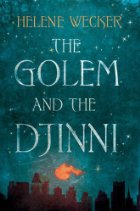 Chava, a golem only a few days old, is stranded on a boat to New York City in the early twentieth century with no idea who she is, how to live, or where to go. Ahmad is a djinn trapped in a bottle for centuries, unleashed accidentally by a Syrian metalsmith. These two unlikely friends meet and immediately understand what it is to be different from everyone around them. But as those differences force them apart, will they find their way back to one another? Chava, a golem only a few days old, is stranded on a boat to New York City in the early twentieth century with no idea who she is, how to live, or where to go. Ahmad is a djinn trapped in a bottle for centuries, unleashed accidentally by a Syrian metalsmith. These two unlikely friends meet and immediately understand what it is to be different from everyone around them. But as those differences force them apart, will they find their way back to one another?
The Golem and the Djinni is a book that I’ve seen all over the Internet in the last few months. It’s received so many positive reviews that I thought it was well worth reading, not to mention the fact that its blurb compared it to Jonathan Strange and Mr Norrell, a book that I adored. The decision was a good one as I greatly enjoyed this tale of turn of the century New York and its two unusual occupants. The book was certainly heavy on the fantasy, but it worked within the story.
One of the aspects of the book that I found very interesting was the way that the two fantasy characters got adopted into different nationalities. Both of them are effectively christened by and welcomed into the Jewish and the Syrian communities in New York, appropriately in both cases. I know life in the city was difficult for immigrants at the time, with so many seeking the American dream and failing to find that the streets were paved in gold. Instead, many of them found prejudice and further poverty. But I love stories about it anyway, particularly the way that immigrants sought familiarity and made their own little communities, and I enjoyed the way these two were still further distanced even from those immigrants. They are a world unto themselves, even while many of their experiences are echoed by others.
The fantasy aspects themselves are well integrated within the novel; I didn’t think the world felt too inconsistent. Both Chava and Ahmad belong distinctly to Old World mythology. They are creatures which have long been consigned to tales, but which truly existed in their own parts of the world. As such, when people close to them realize what they are, they often understand the nature of their beings but have a difficult time imagining that they’re real. They delve into old books and legends to find out the truth, which of course adds just another layer to the book’s appeal.
And, of course, there is the relationship between Chava and Ahmad. It took some time for them to meet, and their initial interactions are tentative, but the way they work together makes sense, even if they aren’t technically human. It was easy for me to relate to both characters and I was very invested in the outcomes of their lives.
I really enjoyed this read – I would definitely recommend The Golem and the Djinni to those who enjoy a mix of fantasy and historical fiction.
All external book links are affiliate links. I received this book for free for review.
 Time // A very jetlagged 16:21 Time // A very jetlagged 16:21
Place // Still at my desk – despite attempts to write posts on the iPad, I’ve not been hugely successful yet.
Eating // A chicken salad, slightly earlier.
Drinking // Water
Reading // I finally finished Vanished Kingdoms last week, just before I left for a week at home in the United States. I’ve read a lot since then; I managed to finish The Curse of the Pharaohs by Elizabeth Peters, Songs of Willow Frost by Jamie Ford, and The Golem and the Jinni by Helene Wecker this week! I’m now solely reading Skinwalker by Faith Hunter, which is the start in yet another urban fantasy series that I hope to finish at some point this evening.
Watching // We still haven’t finished either House of Cards or Babylon 5! We should be making some headway into both this week, though.
Cooking // I made Lazy Layered Eggplant a second time and it did indeed turn out better when I added more spices. This week I’m hoping to make my own version of chicken saag (potentially following this recipe) as it’s my favorite curry and it would be lovely to have without resorting to a takeaway.
Learning // I passed my driving test! Now I need to find something new to learn, although I have a feeling I’ll still be learning how to drive our car instead of the instructor’s for some time.
Now that my next trip is to Spain, I’m going to start reading some medieval Spanish history. Starting with this book:
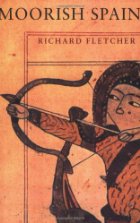
Gaming // I’m installing Rome II: Total War as we speak and can’t wait for it to be ready! It’s received some rave reviews so far and, while I am typically pretty appallingly bad at Total War games, I also completely love them.
Loving/Hating // I love that I have read so many amazing books lately; I kind of hate that I haven’t written any reviews for them yet! It’s been very quiet around here lately.
Anticipating // Our trip to Spain in November; sleeping in my own bed again after a week away; reading Chimes at Midnight by Seanan McGuire!
As usual credit goes to Kim for the Currently format!
Hope you’re all having a wonderful Sunday and have a great week ahead!
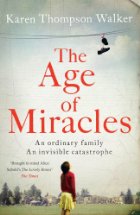 When Julia is eleven years old, the rotation of the earth begins slowing down. Life changes in at first imperceptible ways as days and nights lengthen, but the potential consequences for the planet are huge. As a young girl just coming into her teenage years, though, Julia continues growing up. Plagued by loneliness, introverted Julia discovers things about those she loves, much of which she’d rather not know. She suffers through crushes, choosing what to wear, learning how to flirt, and deciding what she wants to do with her life, while all the while in the background the earth’s rotation starts to narrow the possibilities. When Julia is eleven years old, the rotation of the earth begins slowing down. Life changes in at first imperceptible ways as days and nights lengthen, but the potential consequences for the planet are huge. As a young girl just coming into her teenage years, though, Julia continues growing up. Plagued by loneliness, introverted Julia discovers things about those she loves, much of which she’d rather not know. She suffers through crushes, choosing what to wear, learning how to flirt, and deciding what she wants to do with her life, while all the while in the background the earth’s rotation starts to narrow the possibilities.
This is a short, intensely thoughtful book, a coming of age for Julia amidst speculation on what would actually happen if an apocalyptic event, no matter how minor at first, took place. When the books starts everything is normal. Julia has a best friend, a crush, piano lessons, soccer, school; over the course of the book, some of these erode away as the fabric of life changes drastically. People suffer from lack of daylight and some crops no longer grow. Animals, and then people, get sick. While there is time to plan, there is never enough time, and the future is consistently uncertain.
Growing up in this climate makes life even more difficult for Julia. She’s shy and has no idea how to act around potential friends or boyfriends. Everyone and everything is changing around her and she feels left behind and as though she’s standing still. It is so easy to feel for her and understand that transition period between girlhood and womanhood, when you’re not quite sure if all of the other girls know what they’re doing but you feel they must be ahead of you. The earth is slowing and, to an extent, so is Julia. This is what makes the book so introspective – we spend the entire time inside Julia’s head, only really understanding her perspective on things and finding what changes her.
I liked this book; I liked the way it made me think about how much we take the world for granted (a lesson everyone needs sometimes) and what would happen if things changed so catastrophically. I wouldn’t have minded if the book pushed this further, though, in the vein of a full science fiction novel. Some of the effects this might have on civilization are explored, but not in that much depth. I also liked Julia, although at times she was too internally focused even for me. Some of the interactions she has with other characters are just uncomfortable, which I suspect is the point. I’d also have liked the book to last longer; at the end we’re told she’s 23 but that skips out a decade of her life, so it feels as though the plot threads aren’t wrapped up properly.
Overall I felt I’d finished The Age of Miracles looking for more; this was a wonderful concept and I enjoyed it, but I really just wanted to spend more time learning about what might happen and where Julia’s life went after that year.
All external links are affiliate links. I received this book for free for review.
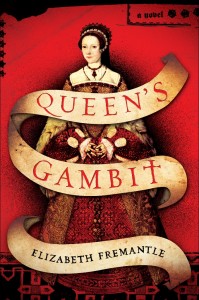 When her second husband dies of cancer, Katherine Parr returns to court to attend Lady Mary, Henry VIII’s elder daughter. Though she’s quickly enchanted by her brother’s friend Thomas Seymour, Katherine catches the King’s eye unintentionally and before she knows it, she’s Queen of England, with her every word, step and expression monitored intensely by her husband and the court. Katherine’s life is regularly at risk. One of her few allies is her stepdaughter’s friend, Dorothy Fowndon. Dot is a lowborn girl brought into service for Katherine’s relatively ordinary life, who remains close to the Queen and is raised up by faithful service to be a gentlewoman. But an existence so close to Henry VIII is dangerous, as his previous wives showed, and Katherine and Dot must always be on their best behaviour or risk losing their heads to his whims. When her second husband dies of cancer, Katherine Parr returns to court to attend Lady Mary, Henry VIII’s elder daughter. Though she’s quickly enchanted by her brother’s friend Thomas Seymour, Katherine catches the King’s eye unintentionally and before she knows it, she’s Queen of England, with her every word, step and expression monitored intensely by her husband and the court. Katherine’s life is regularly at risk. One of her few allies is her stepdaughter’s friend, Dorothy Fowndon. Dot is a lowborn girl brought into service for Katherine’s relatively ordinary life, who remains close to the Queen and is raised up by faithful service to be a gentlewoman. But an existence so close to Henry VIII is dangerous, as his previous wives showed, and Katherine and Dot must always be on their best behaviour or risk losing their heads to his whims.
I’ve always known Katherine Parr as the wife that finally survived Henry VIII, probably like most people who have even a remote interest in history. I remembered the framework of her life simply because I’ve been interested in Tudor history for years; I knew who she married and how she died, and that she was close at one point to Elizabeth, not yet too close to the throne at that point. But I couldn’t have imagined what a complex and touching story that an author like Fremantle could weave out of that framework. This is a fantastic book and one that easily transported me to the Tudor history I remember loving before the volume of books became overwhelming.
It was easy for me to feel as though I understood how difficult Katherine’s situation was. No one could escape the king, certainly not by this point; he’s already beheaded two wives for sins which may well have been fabricated and his mercurial moods mean that Katherine could easily be next. She can’t refuse him, even though her head is completely turned by Thomas Seymour. And that means she must endure marriage to him, at this point a much older, diseased, immense man who has been used to getting his own way for decades. And to make matters worse she’s never carried a baby to term. As such it’s a matter of dread that she’ll almost certainly never conceive a backup prince for the king. Eventually that might be her downfall, and there is absolutely nothing she can do to prevent it. I felt very strongly for her.
One aspect that helped this book rise above a lot of the historical fiction I’ve read in the past few years was the secondary story of Dot. Though this part was probably ahistorical, as acknowledged by the author, Dot gave a wonderful second opinion of Katherine and had her own part to play as she grew up at court. It’s a classic outsider perspective that provides value to the main narrative, but I also appreciated her sweet romance (and other sidetracks), simpler by nature than the queen’s but still complex and challenging in its own way. While other books try to provide this perspective, Fremantle succeeded hugely and I became invested in the stories of both women.
Even if you think you’re sick of Tudor historical fiction, I recommend you give Queen’s Gambit a try. It was a welcome breath of fresh air for me, beautifully written and imagined, with an engaging story that allowed me to step right into history. Highly recommended.

I received this book for review as part of the Historical Fiction Virtual Book Tour. Find the rest of the tour schedule here.
All external book links are affiliate links.
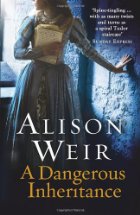 For Lady Katherine Grey, sister of Lady Jane Grey, Edward VI’s chosen heir, the Wars of the Roses lie in the past. Already, tales of Richard III are growing in exaggeration as the Tudor monarchs do their best to establish their rightful rule. For Katherine Plantagenet, illegitimate daughter of Richard III, the Wars of the Roses control her life, and she watches as her beloved father’s reputation sinks and her royal cousins vanish in real time. What ties these two women together is their curiosity and somehow urgent need to know what happened to the two little princes, as their individual dramas and struggles control their lives in the present. For Lady Katherine Grey, sister of Lady Jane Grey, Edward VI’s chosen heir, the Wars of the Roses lie in the past. Already, tales of Richard III are growing in exaggeration as the Tudor monarchs do their best to establish their rightful rule. For Katherine Plantagenet, illegitimate daughter of Richard III, the Wars of the Roses control her life, and she watches as her beloved father’s reputation sinks and her royal cousins vanish in real time. What ties these two women together is their curiosity and somehow urgent need to know what happened to the two little princes, as their individual dramas and struggles control their lives in the present.
I was sure I’d reviewed another of Alison Weir’s novels at one point or another, but I can’t find any that I’ve actually posted. Never mind – I’ve reviewed a number of her non-fiction books and I do tend to like them. I often find her fiction dry, though, and unfortunately A Dangerous Inheritance wasn’t an exception to that. I didn’t have any expectations going in, so I don’t think it’s down to a famous name. I think it was a combination of factors.
First, though, what I liked about the book. I love the way Weir throws in many details about the period. Right away I spotted that a jewel of Kate’s was clearly modelled after the Middleham Jewel. She uses real letters, real sources, and includes descriptions that simply feel spot on. I loved these details and knowing that Weir had researched this period to a degree where she could recreate what happened effectively.
The book also opens dramatically, setting up both Kate and Katherine’s stories in a way that immediately caught my attention. I was in particular interested in Katherine, because while I knew what happened to Jane, I couldn’t remember what happened to her sisters, and definitely didn’t predict Katherine’s life.
Unfortunately, after that, I felt that the book dragged on. Towards the middle, we reach a point where the women, though still teenagers, are both fixated and in love with men that they simply cannot have for different reasons. They seemed to spend an eternity pining for their respective lovers, to the degree that even while quite a bit else was happening, they languished over this for ages. I hardly felt like these wronged lovers really deserved much emotional attachment, and I ended up just wanting to know what happened to them at the end. Their relationships feel contrived, not genuine, and I think this held the book back.
Secondly, towards the end, when Katherine is putting together the story of the princes in the Tower, I quite frankly just got bored. She spends time reading all the big names and chronicles to see what happened, and then goes through a lengthy pages-long process justifying why ultimately she believes Thomas More and has come to the same conclusions as Weir herself. In non-fiction – fine, this is exactly what I want to read. In fiction – not so much. I wasn’t convinced by Katherine’s arguments, and as I actually haven’t read Weir’s own non-fiction book on the Wars of the Roses, I can’t comment on her views either.
Bizarrely, though the novel follows that extremely logical approach to determining what happened to the princes, it contains some oddly-placed supernatural elements, generally when one woman is in a place where something significant happened to the other. As I didn’t really get the connection between them anyway, these segments felt out of place. The connection seemed contrived to me; all the women had in common was their names and the fact that they were interested in the princes. Their positions were both close to the throne, but Kate would never be a threat to her father’s kingship, while Katherine’s life was dominated by the fact that she was very few steps from the throne at all times and was a potential magnet for discontented European and English powers.
Ultimately, I found A Dangerous Inheritance disappointing. I think I’ll stick to Weir’s non-fiction in the future.
All external links are affiliate links. I received this book for free for review.
 I’ve decided to try using the “Currently” format, which I first saw over on Kim’s blog, for my Salon this week. I changed some bits, though, to suit me a little better. I’ve decided to try using the “Currently” format, which I first saw over on Kim’s blog, for my Salon this week. I changed some bits, though, to suit me a little better.
Time // 13:13
Place // At my desk in our computer room
Eating // Nothing at the moment, but pizza is for lunch I think!
Drinking // A glass of water
Reading // I’m now deep into Vanished Kingdoms: The History of Half-forgotten Europe by Norman Davies, which is just as fascinating as I thought it would be when I first got it. Davies delves into the history of the various countries and states that didn’t make it to the present, and which have been forgotten through the years. So far, I’ve read about a kingdom in Scotland (Alt Clud), one in modern-day Spain (Tolosa) and am now reading about Litva, which was in eastern Europe and was formerly the area around Belarus.
I’ve also just barely started Queen Victoria’s Book of Spells which is an anthology of “gaslamp fantasy” edited by Ellen Datlow and Terri Windling – basically, fantasy set in the 19th century. I’m hoping to read a few of the stories this afternoon.
Watching // We’re still watching Babylon 5 at home and with a friend we’re watching House of Cards. I’m not even sure how I feel about the latter show, because it’s so immoral and extreme, but I love Babylon 5. I think we’ll also go see Elysium in the movie theater next weekend.
Cooking // I’ve been making an effort when it comes to cooking over the last few weeks. I tend to try to make at least one recipe from my Pinterest board each week. Last week I made Potato and Goat’s Cheese Gratin, which was lovely and went really well with fish but needed more time in my oven, unfortunately. I also made Lazy Layered Eggplant which will also be made again in my kitchen! I needed to up the spices just a tad but the flavors were wonderful.
Learning // I’m still learning to drive. I’ve been learning to drive for months now and I actually am physically capable of driving a manual car with relative ease now (at last). I had to delay my test because I went home for my grandma’s funeral right at the time where I was meant to take it, and because booking it is so slow, have had to wait an additional two months. But it’s coming up soon, and my fingers are crossed!
Gaming // I’ve recently purchased the latest Civilization V expansion pack, Brave New World, which is great fun when I feel like investing a couple of hours into building my own little civilization.
Loving/Hating // Mainly I love that I’m actually continuing to feel inspired with my cooking. I’ve been making lunches for my husband and myself and have really been focusing on buying more fresh and less packaged foods. We still buy back-up frozen fish and vegetables, but it’s so nice knowing that we’re sticking to healthier choices.
Anticipating // In the immediate future I’m really looking forward to next Monday’s bank holiday. I love free days off work, and this is our last one until Christmas. A three day weekend always means I’m just slightly more energized for work. In the longer term I can’t wait for my trip to Spain in November. I’ve already started planning out what books I’m going to read beforehand and what days we’ll be spending where. We haven’t been out of the country on a proper trip except to visit my parents for two years, so I’m thrilled to be going somewhere new at last. This will also be our longest holiday together, since we’re finally able to go for a week.
I’m also anticipating finally selling the flat we’ve owned in Wolverhampton for years; getting rid of that burden will mean we can start saving for our future much more than we do now, and actually begin to make plans about it. I can’t wait!
How is your Sunday going?
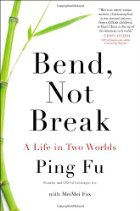 Ping Fu is the incredibly successful founder and CEO of Geomagic, Inc. She’s been Entrepreneur of the Year in Time Magazine and met President Barack Obama. But she also spent her childhood living in a furniture-less dorm with her little sister during Mao’s Cultural Revolution in China. She’s been beaten and raped simply because her family was well-to-do and educated. She was thrust into a role of responsibility at a very young age, punished constantly, and finally deported from her native country with no ability to speak English and no idea what to do with her life. Her story is one of contrasts and success against all the odds. Ping Fu is the incredibly successful founder and CEO of Geomagic, Inc. She’s been Entrepreneur of the Year in Time Magazine and met President Barack Obama. But she also spent her childhood living in a furniture-less dorm with her little sister during Mao’s Cultural Revolution in China. She’s been beaten and raped simply because her family was well-to-do and educated. She was thrust into a role of responsibility at a very young age, punished constantly, and finally deported from her native country with no ability to speak English and no idea what to do with her life. Her story is one of contrasts and success against all the odds.
A couple of years ago I read quite a few books featuring the Cultural Revolution. China is a fascinating country that is completely outside my own experience. Ping Fu’s book Bend, Not Break promised to combine this history with the story of a woman living the American dream.
Ping’s story is a true testament to the power of her own will and ability to seize opportunities as they come. She is beaten down regularly from a very young age, but she’s also determined to make something of herself. She never lets her experiences truly box her in, and as soon as she’s given the opportunity at a Chinese university, she straight away starts trying to make a difference. It’s no surprise that when she lands in the United States speaking little more than “hello” and “thank you” that she immediately begins to make something of herself. She learns English quickly, enrolls in a good university, and begins waitressing to pay the bills.
This was a surprisingly inspiring book which shows how far you can go simply on the basis of trying very hard. The author is very clear that things were challenging for her; she loved software development, which she eventually made her career, but she only loved parts of it, and it’s those parts that she focused on to become a success. She struggles with being a CEO in particular; in a world dominated by tall white men, she feels out of place, and for a time believes that she needs a handsome, charming tall white guy to make her business successful (this is one case where she’s wrong). She’s not afraid to admit when she’s wrong or where she has a disadvantage and she always does her best to surmount it.
Since finishing this book, I’ve read some very critical articles online which state that many of the events in the book aren’t quite true. Like most memoirs, parts of the book simply have to be imagined. I doubt anyone can remember an exact quote from their mother from the age of eight (I certainly can’t). There are claims that she was as thoroughly a Red Guard as the other children, and that deportation was a crime reserved for more severe offenses, mostly by other Chinese people. This has made it difficult for me to recommend the book, but having read previously about how difficult the Cultural Revolution was, I choose to believe the author’s story. I think that’s a decision every reader will have to make.
I received this book for free for review. All external book links are affiliate links.
 Dortchen Wild falls in love with Wilhelm Grimm, the handsome older brother of her best friend, the moment she meets him – but she’s only twelve years old. As she grows, her love only deepens, and soon Wilhelm returns her interest, particularly when he hears about the folk tales that she’s learned from Old Marie, the Wild family’s nurse. Wilhelm and his older brother Jakob have been collecting old German folk tales with the hope of eventually getting them published and making their fortune. Wilhelm and Dortchen begin meeting in secret, as Dortchen’s forbidding father will not hear of the pair associating, and fall in love. Dortchen Wild falls in love with Wilhelm Grimm, the handsome older brother of her best friend, the moment she meets him – but she’s only twelve years old. As she grows, her love only deepens, and soon Wilhelm returns her interest, particularly when he hears about the folk tales that she’s learned from Old Marie, the Wild family’s nurse. Wilhelm and his older brother Jakob have been collecting old German folk tales with the hope of eventually getting them published and making their fortune. Wilhelm and Dortchen begin meeting in secret, as Dortchen’s forbidding father will not hear of the pair associating, and fall in love.
This was an incredible book. It sounded interesting to start with – who doesn’t want to read fiction about the love life of one of the Brothers Grimm? – and completely lived up to that promise. I loved Dortchen and I found her story completely compelling. She starts out as a spirited young girl, the “wild girl” of the book’s title, who loves the forest and spending time with her friend and adores Wilhelm beyond reason. As she grows older, her father’s unwillingness to let her go, even as her sisters marry, and some events I won’t spoil start to shrink her spirit. She ends up with ridiculously difficult hardships to surmount, with some passages so agonizing that I actually had to look on Wikipedia to find out what was going to happen in Dortchen’s life because I couldn’t bear the suspense.
Life isn’t easy for anyone in this period. Living in the Holy Roman Empire during the Napoleonic wars, the town of Cassel is taken again and again as Napoleon and then the Russians battle for control. Times are hard, food is scarce, and war seems never-ending, sometimes right on the family’s front steps. Every young man is at risk of going to war. Almost every family lives on the edge.
On a personal level, the book handles some very tough issues, like what happens between Dortchen and her father. This part of the book is entirely speculation on the author’s behalf, which she admits; it’s known that Dortchen and Wilhelm fell in love at a certain point but then spent unexplained years without getting married. The author attempts to imagine what might have happened to cause this huge gap, and this certainly works within the context of the story. It also provides an insight into the very difficult life of a girl who is abused in this way, systematically and repeatedly, and how damaging that might be to her image of herself, even when the abuse has theoretically ended. It was heart-breaking and utterly agonizing to read, which is an indication I think that the author has done her job correctly.
In the midst of this, though, is a sweet, wonderful, long-lasting romance between Wilhelm and Dortchen. It isn’t always easy, and they spend months apart or not speaking at times, but neither can let go of the other. And the ending was certainly enough to bring me to tears, after reading about so much hardship. The fairy tales and the romance give this book an edge out of the difficulties that torment the people within it, and ultimately make it a stand-out read.
Highly recommended.
I received and read this book as part of a book tour organized by Historical Fiction Virtual Book Tours. You can check out the remaining tour stops here.

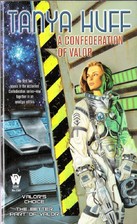 If someone had told me five years ago that I would read a series that was ultimately military science fiction and absolutely love it, I would have laughed at them. Well, maybe not out loud, but I wouldn’t have believed a word. If someone had told me five years ago that I would read a series that was ultimately military science fiction and absolutely love it, I would have laughed at them. Well, maybe not out loud, but I wouldn’t have believed a word.
Enter these books, and my younger self is completely proven wrong.
Staff Sergeant Torin Kerr is the star of these books. She’s a tough Marine who takes her responsibility for her people very seriously, which is one of her most endearing traits. They’re her Marines, and her primary objective (aside from following orders) is always to bring them home.
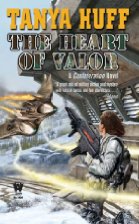 But these aren’t books that are simply full of missions. Though each one is shaped around a particular mission, even in a sense the last one, they’re also very character-focused, especially on Torin. Her essential nature never changes, but she begins to understand a number of aspects of the world around her as the books go on, and she adapts to every circumstance. While she’s clearly in charge, the books also switch viewpoints to focus on the Marines. I’m not in the military, and would prefer to keep it that way, but I couldn’t have imagined a better depiction of what must happen when a trained group of people form for the exclusive purpose of fighting other people. I will admit freely that I often forgot the names of some of these Marines, because they change from book to book (with a few exceptions) but the sense of camaraderie and spirit remains the same. But these aren’t books that are simply full of missions. Though each one is shaped around a particular mission, even in a sense the last one, they’re also very character-focused, especially on Torin. Her essential nature never changes, but she begins to understand a number of aspects of the world around her as the books go on, and she adapts to every circumstance. While she’s clearly in charge, the books also switch viewpoints to focus on the Marines. I’m not in the military, and would prefer to keep it that way, but I couldn’t have imagined a better depiction of what must happen when a trained group of people form for the exclusive purpose of fighting other people. I will admit freely that I often forgot the names of some of these Marines, because they change from book to book (with a few exceptions) but the sense of camaraderie and spirit remains the same.
This is science fiction, and as such, a lot of the books are spent in space or exploring distant worlds. As I am both unfamiliar with the military and with actual space travel, the first book took an investment of time for me to actually sink into the world. The aliens come with particularly defining characteristics that do make their species easy to remember, though, and reminders for these are sprinkled throughout the books without ever becoming overwhelming. I read them in quick succession, and I never felt that I’d read that the Krai ate anything too many times. Usually, Huff works these details into the plot well.
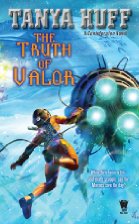 Speaking of plots, they’re very well done. Though each is a mission of sorts, the circumstances around them are entirely different. Each book builds on the overarching plot and takes the opportunity to make a story that spans not only one book but the whole series. While each concludes and doesn’t end on a cliffhanger, I always wanted more, and bought the last two books at once because I knew I wouldn’t want to stop reading. Speaking of plots, they’re very well done. Though each is a mission of sorts, the circumstances around them are entirely different. Each book builds on the overarching plot and takes the opportunity to make a story that spans not only one book but the whole series. While each concludes and doesn’t end on a cliffhanger, I always wanted more, and bought the last two books at once because I knew I wouldn’t want to stop reading.
And, you wouldn’t predict this going in, certainly not until the third book, but there is even some romance in these books, although it’s the subtle, heart-felt kind of romance that I think I love the best of all.
Once you’ve reached Heart of Valor, in my view, the series becomes golden, and I loved every minute of the last three books. The set-up in books 1 and 2 (combined now as the omnibus A Confederation of Valor) is 100% worth it. This is beautifully character-focused science fiction, excellent for both those who like their spaceships and those who need strong, relate-able characters in their books. Very highly recommended.
I bought all of these books.
I’m not sorry to see the back of July – it was a rough month. On the positive side, as I’ve seen many UK bloggers commenting, we’ve had the best weather I’ve ever seen in this country this month. We’ve had some absolutely beautiful days, with the temperature reaching into the low 80’s and weeks of sunshine. My cold-blooded body has been soaking up every minute, and particularly enjoying the opportunity to wear dresses without worrying about leggings, tights or cardigans. We skipped summer last year, but we’ve had it in earnest this year. The sunshine has gone a long way towards boosting my spirits and I hope those of others, too.
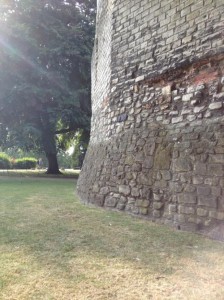 Can’t ask for more than reading in the sunshine right outside the York city walls! I’ve still been reading, though! I’ve tried to post at least twice a week to catch up with some book reviews, which has been working decently. I’m also doing my best, as usual, to come up with some different post ideas. Hopefully I’ll have the brain power to invest in those soon.
I finished a total of 16 books this month.
Fiction
- Revealed, Kate Noble
- The Darkest Edge of Dawn, Kelly Gay
- The Engagements, J. Courtney Sullivan
- On Basilisk Station, David Weber
- Once Upon a Tower, Eloisa James
- Greywalker, Kat Richardson
- Me Before You, Jojo Moyes
- Madame Serpent, Jean Plaidy
- The Brides of Rollrock Island, Margo Lanagan
- Valor’s Trial, Tanya Huff
- Truth of Valor, Tanya Huff
- The Long Earth, Terry Pratchett and Stephen Baxter
- The Ill-Made Knight, Christian Cameron
- Cobweb Bride, Vera Nazarian
Non-fiction
Favorites of the Month
 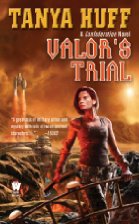
I loved this series such an absurd amount that they win over everything else, although I did read some wonderful other books this month too. It appears that my new favorite genre is character-focused sci-fi, especially featuring amazing women. (On Basilisk Station is pretty good too, and also happens to be offered by the publisher for free in ebook form.) I’m writing a series love post, so you will be hearing more about these books very shortly.
What’s Ahead for August
I have a few books for review in that list up there which you’ll be seeing in August.
I also have this lovely pile which I plan on getting through:
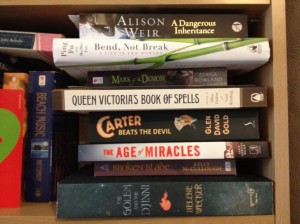
I hope I’ll manage to read all 8 of those, plus the two I’m currently reading – The Wild Girl by Kate Forsyth and Witchling by Yasmine Galenorn.
In addition, I’m planning to post about my upcoming trip to Spain. I think I’ve mentioned it before, but now I’ve gone ahead and booked hotels, planned flights, and worked out costs, so it’s actually happening and I can get properly excited. I’ve already picked out a couple of books that I’d like to read beforehand, but any suggestions on books set in medieval Spain, especially Andalucia, are much welcomed.
How was your reading month? What’s ahead for August?
|
|
 Chava, a golem only a few days old, is stranded on a boat to New York City in the early twentieth century with no idea who she is, how to live, or where to go. Ahmad is a djinn trapped in a bottle for centuries, unleashed accidentally by a Syrian metalsmith. These two unlikely friends meet and immediately understand what it is to be different from everyone around them. But as those differences force them apart, will they find their way back to one another?
Chava, a golem only a few days old, is stranded on a boat to New York City in the early twentieth century with no idea who she is, how to live, or where to go. Ahmad is a djinn trapped in a bottle for centuries, unleashed accidentally by a Syrian metalsmith. These two unlikely friends meet and immediately understand what it is to be different from everyone around them. But as those differences force them apart, will they find their way back to one another?

 Time // A very jetlagged 16:21
Time // A very jetlagged 16:21
 When Julia is eleven years old, the rotation of the earth begins slowing down. Life changes in at first imperceptible ways as days and nights lengthen, but the potential consequences for the planet are huge. As a young girl just coming into her teenage years, though, Julia continues growing up. Plagued by loneliness, introverted Julia discovers things about those she loves, much of which she’d rather not know. She suffers through crushes, choosing what to wear, learning how to flirt, and deciding what she wants to do with her life, while all the while in the background the earth’s rotation starts to narrow the possibilities.
When Julia is eleven years old, the rotation of the earth begins slowing down. Life changes in at first imperceptible ways as days and nights lengthen, but the potential consequences for the planet are huge. As a young girl just coming into her teenage years, though, Julia continues growing up. Plagued by loneliness, introverted Julia discovers things about those she loves, much of which she’d rather not know. She suffers through crushes, choosing what to wear, learning how to flirt, and deciding what she wants to do with her life, while all the while in the background the earth’s rotation starts to narrow the possibilities. When her second husband dies of cancer, Katherine Parr returns to court to attend Lady Mary, Henry VIII’s elder daughter. Though she’s quickly enchanted by her brother’s friend Thomas Seymour, Katherine catches the King’s eye unintentionally and before she knows it, she’s Queen of England, with her every word, step and expression monitored intensely by her husband and the court. Katherine’s life is regularly at risk. One of her few allies is her stepdaughter’s friend, Dorothy Fowndon. Dot is a lowborn girl brought into service for Katherine’s relatively ordinary life, who remains close to the Queen and is raised up by faithful service to be a gentlewoman. But an existence so close to Henry VIII is dangerous, as his previous wives showed, and Katherine and Dot must always be on their best behaviour or risk losing their heads to his whims.
When her second husband dies of cancer, Katherine Parr returns to court to attend Lady Mary, Henry VIII’s elder daughter. Though she’s quickly enchanted by her brother’s friend Thomas Seymour, Katherine catches the King’s eye unintentionally and before she knows it, she’s Queen of England, with her every word, step and expression monitored intensely by her husband and the court. Katherine’s life is regularly at risk. One of her few allies is her stepdaughter’s friend, Dorothy Fowndon. Dot is a lowborn girl brought into service for Katherine’s relatively ordinary life, who remains close to the Queen and is raised up by faithful service to be a gentlewoman. But an existence so close to Henry VIII is dangerous, as his previous wives showed, and Katherine and Dot must always be on their best behaviour or risk losing their heads to his whims.
 For Lady Katherine Grey, sister of Lady Jane Grey, Edward VI’s chosen heir, the Wars of the Roses lie in the past. Already, tales of Richard III are growing in exaggeration as the Tudor monarchs do their best to establish their rightful rule. For Katherine Plantagenet, illegitimate daughter of Richard III, the Wars of the Roses control her life, and she watches as her beloved father’s reputation sinks and her royal cousins vanish in real time. What ties these two women together is their curiosity and somehow urgent need to know what happened to the two little princes, as their individual dramas and struggles control their lives in the present.
For Lady Katherine Grey, sister of Lady Jane Grey, Edward VI’s chosen heir, the Wars of the Roses lie in the past. Already, tales of Richard III are growing in exaggeration as the Tudor monarchs do their best to establish their rightful rule. For Katherine Plantagenet, illegitimate daughter of Richard III, the Wars of the Roses control her life, and she watches as her beloved father’s reputation sinks and her royal cousins vanish in real time. What ties these two women together is their curiosity and somehow urgent need to know what happened to the two little princes, as their individual dramas and struggles control their lives in the present. Ping Fu is the incredibly successful founder and CEO of Geomagic, Inc. She’s been Entrepreneur of the Year in Time Magazine and met President Barack Obama. But she also spent her childhood living in a furniture-less dorm with her little sister during Mao’s Cultural Revolution in China. She’s been beaten and raped simply because her family was well-to-do and educated. She was thrust into a role of responsibility at a very young age, punished constantly, and finally deported from her native country with no ability to speak English and no idea what to do with her life. Her story is one of contrasts and success against all the odds.
Ping Fu is the incredibly successful founder and CEO of Geomagic, Inc. She’s been Entrepreneur of the Year in Time Magazine and met President Barack Obama. But she also spent her childhood living in a furniture-less dorm with her little sister during Mao’s Cultural Revolution in China. She’s been beaten and raped simply because her family was well-to-do and educated. She was thrust into a role of responsibility at a very young age, punished constantly, and finally deported from her native country with no ability to speak English and no idea what to do with her life. Her story is one of contrasts and success against all the odds. Dortchen Wild falls in love with Wilhelm Grimm, the handsome older brother of her best friend, the moment she meets him – but she’s only twelve years old. As she grows, her love only deepens, and soon Wilhelm returns her interest, particularly when he hears about the folk tales that she’s learned from Old Marie, the Wild family’s nurse. Wilhelm and his older brother Jakob have been collecting old German folk tales with the hope of eventually getting them published and making their fortune. Wilhelm and Dortchen begin meeting in secret, as Dortchen’s forbidding father will not hear of the pair associating, and fall in love.
Dortchen Wild falls in love with Wilhelm Grimm, the handsome older brother of her best friend, the moment she meets him – but she’s only twelve years old. As she grows, her love only deepens, and soon Wilhelm returns her interest, particularly when he hears about the folk tales that she’s learned from Old Marie, the Wild family’s nurse. Wilhelm and his older brother Jakob have been collecting old German folk tales with the hope of eventually getting them published and making their fortune. Wilhelm and Dortchen begin meeting in secret, as Dortchen’s forbidding father will not hear of the pair associating, and fall in love.
 If someone had told me five years ago that I would read a series that was ultimately military science fiction and absolutely love it, I would have laughed at them. Well, maybe not out loud, but I wouldn’t have believed a word.
If someone had told me five years ago that I would read a series that was ultimately military science fiction and absolutely love it, I would have laughed at them. Well, maybe not out loud, but I wouldn’t have believed a word. But these aren’t books that are simply full of missions. Though each one is shaped around a particular mission, even in a sense the last one, they’re also very character-focused, especially on Torin. Her essential nature never changes, but she begins to understand a number of aspects of the world around her as the books go on, and she adapts to every circumstance. While she’s clearly in charge, the books also switch viewpoints to focus on the Marines. I’m not in the military, and would prefer to keep it that way, but I couldn’t have imagined a better depiction of what must happen when a trained group of people form for the exclusive purpose of fighting other people. I will admit freely that I often forgot the names of some of these Marines, because they change from book to book (with a few exceptions) but the sense of camaraderie and spirit remains the same.
But these aren’t books that are simply full of missions. Though each one is shaped around a particular mission, even in a sense the last one, they’re also very character-focused, especially on Torin. Her essential nature never changes, but she begins to understand a number of aspects of the world around her as the books go on, and she adapts to every circumstance. While she’s clearly in charge, the books also switch viewpoints to focus on the Marines. I’m not in the military, and would prefer to keep it that way, but I couldn’t have imagined a better depiction of what must happen when a trained group of people form for the exclusive purpose of fighting other people. I will admit freely that I often forgot the names of some of these Marines, because they change from book to book (with a few exceptions) but the sense of camaraderie and spirit remains the same. Speaking of plots, they’re very well done. Though each is a mission of sorts, the circumstances around them are entirely different. Each book builds on the overarching plot and takes the opportunity to make a story that spans not only one book but the whole series. While each concludes and doesn’t end on a cliffhanger, I always wanted more, and bought the last two books at once because I knew I wouldn’t want to stop reading.
Speaking of plots, they’re very well done. Though each is a mission of sorts, the circumstances around them are entirely different. Each book builds on the overarching plot and takes the opportunity to make a story that spans not only one book but the whole series. While each concludes and doesn’t end on a cliffhanger, I always wanted more, and bought the last two books at once because I knew I wouldn’t want to stop reading.









Recent Comments